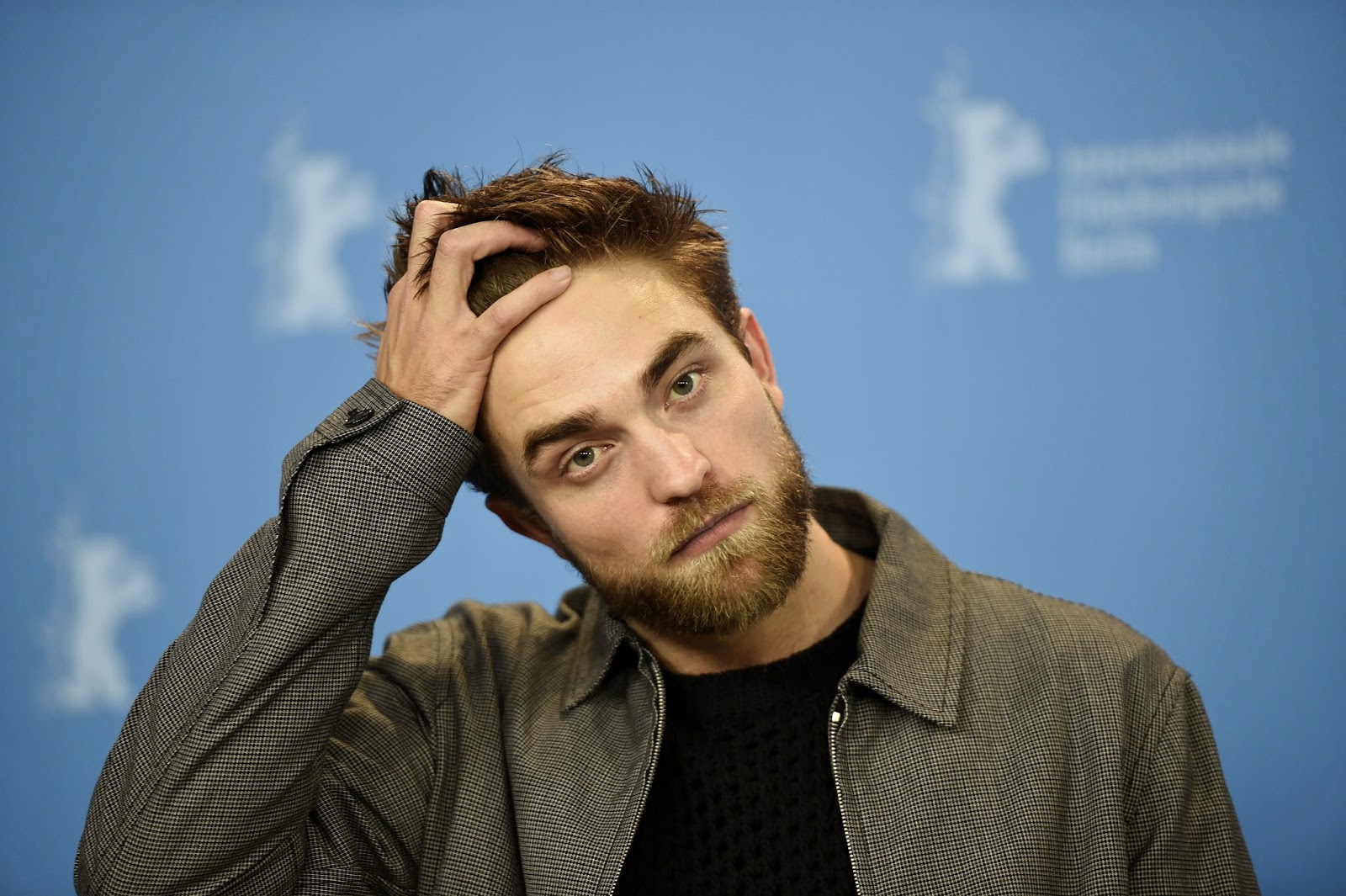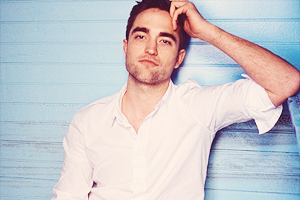Ever since the Twilight films turned him into an object of mass attention, Robert Pattinson has tried to find his way clear of fan obsession and make his mark as a serious actor. Films like Cosmopolis and Bel Ami helped distance audiences from his vampire alter ego, and now, in Anton Corbijn's Life, Pattinson gives what is arguably the best performance of his career. The 28-year-old heartthrob plays Dennis Stock, the photographer whose iconic photos of James Dean during the last months of his life have sustained the actor's legend even more than his films.
"James Dean is very much an iconic figure to me," Pattinson says. "He represents disaffected youth and alienation in a powerful way that still resonates with us. Those photos of Dean, like the one where he is walking in Times Square, are much more part of our image and impression of him than his films. You can feel his aura and mystique in those photos."
It was an ironic choice of roles for Pattinson who was able to experience what life is like on the other side of the camera lens: "When you're on the red carpet, it's an eerie experience because you don't see the photographers because you're blinded by the lights and flashes most of the time! As a photographer, you get to hide behind your camera."
One of the hottest films at the recently concluded Berlin International Film Festival, LIFE explores the parallel lives of James Dean - played by Dane DeHaan - and Dennis Stock (Pattinson) while the latter was on a road trip taking photos of Dean as part of an assignment for Life Magazine, one of the most popular magazines of its era. The photos subsequently became the stuff of legend and posters that young people would put on their walls as a symbol of youthful rebellion and cool.
Pattinson not only understood something of how James Dean must have felt when his career skyrocketed within a very short time in Hollywood, but also how today's stars - Pattinson included - are so overexposed that they lose all mystery.
"People didn't know that much about Dean's private life and those photos that Stock took of him had so much more impact and meaning than anything you could imagine today," Pattinson muses about the work of the photographer who passed away in 2010.
For director Anton Corbijn, the film also has a deeper meaning in that before he became better known as a filmmaker, he achieved considerable fame for his NME photo shoot of Joy Division frontman Ian Curtis shortly before he hung himself. Like Stock did with his photos of Dean, The images of Curtis taken by Corbijn have in their own way amplified the legend of the fabled singer and Corbijn subsequently directed the film Control which depicted Curtis's dark and difficult life.
Wearing a fairly lush beard and looking pleasantly disheveled, Robert Pattison was greeted by adoring crowds during his stay at the Berlin festival. He was wearing a grey Armani jacket and jeans for our chat at the five-star Hotel de Rome.
In addition to Life, audiences will see Pattinson play Col. T.E. Lawrence in Queen of the Desert, a film starring Nicole Kidman and directed by Werner Herzog.
THE INTERVIEW
Q: Robert, it must have been inspiring to play an iconic photographer like Dennis Stock?
PATTINSON: His photos have played a huge part of our collective consciousness of James Dean and the myth that still surrounds him 55 years after his death. Almost everyone has seen some of those photos and so many people including myself have been influenced by our image and perception of Dean and how he represents disaffected youth. Dean is still one of the key figures who represent a kind of defiance and rebellion and someone who felt the confusion of being young and not wanting to conform or stick to the rules. There are very few photographers who have been able to capture that kind of mystique the way Dennis Stock did.
Q: How did you relate to Dennis Stock and his work as a photographer?
PATTINSON: What fascinated me was that he was an artist who was struggling with living up to his own expectations of what he should be doing as an artist. He doesn't feel he's accomplishing enough or doing the kind of work he wants to be doing. I've spent a long time dealing with the same kind of issues and trying to attain goals that I've set for myself and wanting to do the best work possible. I'm still very driven to do work that challenges me.
Q: Did you go through a James Dean phase in your younger days?
PATTINSON: (Laughs) I think almost every actor has a moment in their live when they are either obsessing over James Dean or trying to imitate some aspect of his personality or his acting style. I was a fan of his even before I wanted to become an actor. We all want to look as cool as he did although it's pretty much impossible! (Laughs) I admire his work greatly although I don't think I'm anything like him and I wouldn't dare to compare myself to him.
Q: Would you have wanted to play Dean yourself?
PATTINSON: No! I wouldn't have dared. And I think Dane (DeHaan) does a brilliant job.
Q: What kind of research did you do to prepare for the film?
PATTINSON: Anton (Corbijn) showed me a taped interview with Dennis Stock in which he was very rude to the interviewer. He was always a very complex figure and he had a lot of anger inside because he was very ambitious and wanted to make his mark as an artist. He was very jealous of other artists.
I also spent several months learning to use a camera and work with cameras the way a professional photographer would use them. I took a lot of photos and practiced the kind of movements a photographer makes while working. For a photographer, the camera is basically an extension of his body and he hides behind it while he's taking photos.
Q: Dennis Stock was very conflicted about his work. Were you the same way?
PATTINSON: I've suffered from a lack of self-belief. You worry that you're just faking it and people will start to see through you. So that fear keeps me going and inspires me to take on as many challenges as I can. I was making things much more difficult for myself by constantly worrying about my work and then I started to realise that I just had to simplify my approach and let my instincts take over. I feel a lot more confident now but I still have enough doubts that make me want to keep improving and evolving as an individual and as an actor.
Q: This kind of movie addresses the issue of celebrity and how an actor becomes larger than life. You've experienced that with your work as Edward Cullen in the Twilight films. How have you transitioned past that part of your career?
PATTINSON: It's become a lot easier as the years have gone on. It's not just that it's been a few years since the last Twilight, it's also that I've become a lot better at handling the attention.
One of the interesting things about the film is that it deals with how someone like Stock can block himself and stand in his own way because of his fears and jealousies. He wanted to be seen as an artist in the same way that Dean was and this was a complex issue for him. I've also dealt with my own anxieties in terms of what I wanted to achieve and my own artistic goals.
Q: How do you feel that process is coming along?
PATTINSON: I feel like I'm where I want to be. I don't feel frustrated anymore by the legacy of Twilight and the fact that I've been identified with my work in those films. I knew that it was going to take some time before people would be able to see me in a different way and that I would have to play a lot of different roles to shake up people's expectations of me. It's normal because of the massive success of those films. But in the long run I've tried to benefit from the attention I gained and find as many interesting roles as I can. I think people are beginning to see me differently now.
Q: Has there been any one film in particular that's helped you feel that you're on the right track in terms of your career?
PATTINSON: I was kind of drifting and unsure of what kinds of films I wanted to do until I did Cosmopolis with David Cronenberg. He offered me the role out of nowhere just a few weeks after I had finished the last Twilight film and suddenly I was thrown into this incredible story and playing a very complicated character. That changed my perspective and I knew that this was the kind of work that I wanted to do. It made a huge difference to me.
Q: Is it easier being Robert Patttinson now?
PATTINSON: (Laughs) I don't know... but I'm having a lot more fun now. You need to get past all the things that are holding you back and then everything starts becoming a lot easier in general.
source
.jpg)










No comments:
Post a Comment